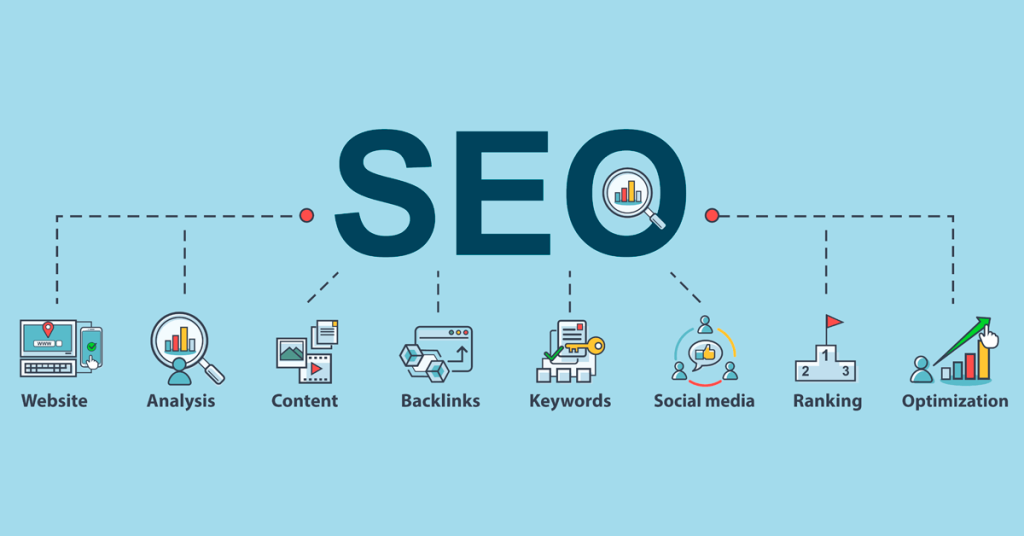Considering tremendous growth rates in all spheres of digital marketing, SEO is still one of the most efficient strategies to attract organic traffic. However, more than basic SEO techniques are required as search engines develop more sophisticated, and AI appears in many fields, including as a potential solution proposal for enhancing SEO techniques. These AI applications empower organizations to optimize content, rank, and get a far better point of view of user interactions. In this article, we shall discover how to get better SEO ideas or, in other words, superior AI power.

1. AI-Powered Keyword Research for Better Targeting
Keyword research is one of the most critical components of any search engine optimization, and AI will enhance it profoundly. However, the basic information that can be extracted from typical keyword research tools is priceless. However, AI takes it to another level by improving that process with something beyond the search intent, competition strategy, and long-tailed keywords. It also assists these tools in PGM in identifying which keyword will get a higher click-through by observing the behavior of users; thus, targeting the exact keyword that creates quality traffic is easily identified.
“When marketers search for keywords that would meet the user’s intentions, machine learning tools like Ahrefs, SEMrush, or Clearscope enable them to search for large volumes of keywords in a given instance. As a result, it is necessary to fine-tune the correct SEO strategies and improve the content’s relevance to the audience. Concerning its features, AI can determine the frequency and seasonal trends as well as the types of questions. As a result, we can aim at the high-possibility, specific, and low-competition keywords.” says Web Design Expert Dan Bowen at Bowen.
2. Content Optimization with AI for Higher Rankings
No new rules have emerged regarding SEO, and content is still element number one, but getting well-optimized content is equally significant. Sometimes, AI content optimization programs such as Surfer SEO and Frase crawl competitors’ content for your target keywords and inform you of a structure, keyword density, and readability standard to target. These tools employ artificial intelligence to suggest the proportion of words to be used, heading, and other keywords, among other vital aspects that lead to content creation.
George Silagadze, Co-Founder and CEO of Handcrafted Photo Art—Photo2Painting, shares, “Incorporating Artificial Intelligence technology in writing content can go a long way in improving the content’s ability to satisfy the expectations of the users and those providing the SERPs. AI tools avoid situations where the input is modified so much that it looks unnatural to a reader because users are the most affected.”

3. Improving User Experience (UX) with AI Insights
“In SEO, user experience is essential, and using AI tools can enhance a website’s usability, display time, and structure. When ranking websites, search engines like Google also consider factors such as page load time, the website’s suitability for mobile devices, and the user experience while browsing the website. As with other issues that AI cannot solve, Google’s Lighthouse or other UX/UI analysis platforms must be used to determine how user experience can be enhanced.” asserts Corey Schafer, SEO Specialist at Florin|Roebig. By analyzing user behavior, AI tools provide:
- Understanding of how its users engage with a particular web page.
- Detecting such problems as a slow rate of loading web pages.
- Difficult navigation.
- Poor mobile design.
Optimization of these aspects enhances user interactions on the site, thus enhancing SEO since it minimizes bounce rates and increases time spent on the site. This lets users tell search engines that their websites contain helpful information, improving their rankings.
4. AI-Driven Content Creation for Scalable SEO
AI to create high-quality content for many websites is possible. Some of those natural language generation and processing tools include Jarvis or Copy.ai, and they are capable of coming up with SEO-friendly content that is natural sounding and, at the same time, optimized for SEO-friendly content,” says Sam Browne, Founder of Find a Band
These tools may help generate meta tags, blog posts and product descriptions as they give artificial intelligence as input. Thus, while people must review and write content, AI can dramatically mitigate the time and energy needed for SEO-friendly text production. It also works based on keyword search and competitor content analysis. It can also give some recommendations regarding content updates so that the business can enhance its content flow while establishing relevancy in its content marketing.
5. Using AI for Voice Search Optimization
“The recent development of voice recognition, wherein customers use voice to search for their queries, has also become an essential component of SEO. Automotive informatics can interpret voice search trends and determine what questions people use when asking a device. One has to consider implementing conversational and even long-tail keywords successfully used for voice searches regarding an offered product or service; for this purpose, one can use either AnswerThePublic or SEMrush-integrated AI tools.” adds Kevin King, Founder & CEO at Anytime Baseball Supply. To ensure that you are adequately prepared for the upturn in voice searches, you must ensure that your website’s content contains these keywords. Infused into the natural language of voice queries, the AI tools can help organize your content to address specific questions or deliver brief answers possibly preferred by voice search spiders.
6. Enhancing Local SEO with AI
“Local SEO targets the company’s local clients to reach as many people in the nearby locality as possible. AI applied to local SEO can benefit companies by enhancing Google My Business profile management, online reviews, and understanding consumers’ local search behavior. Some of these tools include BrightLocal or Moz Local, which will employ artificial intelligence to determine local ranking and competition and provide recommendations on optimizing GMB profiles. AI can also generate content from nearby trends or frequently searched terms, increasing a business’s ranking in local search engines. These are beneficial insights on the part of AI for companies that plan to benefit from local traffic and expand their supply in the community.” says Graham Grieve, Founder of A1 SEO
7. AI for Competitor Analysis
“Knowing your competitors is vital in implementing effective SEO strategies; therefore, competitor analysis uses an AI tool. Here, tools like SEMrush and SpyFu apply AI to learn the competitors’ strategy, analyzing the keywords they target, the backlinks they obtain, and the content that attracts traffic to their websites. This data enables firms to discover other ways of reversing the tide against competitors. By identifying which areas suit competitors, marketers can plan strategy changes to help exploit blind spots and direct attention to uninterrupted opportunities.” adds Gerrid Smith, Founder & CEO of Fortress Growth. Another advantage of using AI in SEO is that it can track an organization’s competitors’ activities in real-time, giving insights that can enable one to tweak the Applications in SEO in real-time.
8. Predictive SEO with AI: Anticipating Future Trends
Undoubtedly, “One of the most captivating uses of AI within SEO is Predictive Analysis—a process that applies machine learning to predict future trends and algorithm changes. MarketMuse, BrightEdge, and other optimization platforms employ artificial intelligence to review data results and estimate how search engines’ algorithms can change or improve in the future. This predictive SEO prepares businesses and brands for changes in search behavior before changes in the Google SEO algorithm happen,” shares David Owens, Content Specialist at The Sauna Heater. It is about using AI to analyze things in an anticipatory manner so that a business can adapt quickly to new changes by overcoming new SEO challenges. LR planning helps companies develop new content or change strategies to remain strong online in advance and meet new trends or changes in user behavior.
9. AI for Progressive Backlink Techniques
“Links are essential to SEO; building good-quality links can often take work. Currently, business organizations are using tools to get a list of the most appropriate sites and probable possibilities for getting backlinks. Another use of AI is analyzing competitors’ backlinks and searching for opportunities to get new links in Ahrefs or SEMrush.
Even regarding backlinks, AI can determine their quality, letting your SEO campaign target high-quality backlinks rather than spammy or low-quality ones. This specific targeting is beneficial when you want to rank higher while enhancing your site in a way the search engine does not detect easily.” – Josh Thill, Founder of Thrive Engine

10. AI for Real-Time SEO Tracker and Report
“SEO is a long-term activity that needs to be maintained by constantly comparing progress with set goals. Another advantage is real-time SEO trend analysis, which helps businesses effectively determine keyword rankings, site performance, and traffic. Tools like SE Ranking and BrightEdge provide AI-based dashboards for real-time data and auto-generated reports to ensure the SEO team is updated with changes.
Using AI in reporting, businesses can easily define the areas of their SEO campaigns that lack performance or require attention. This real-time data enables marketers to make quick decisions based on data, adjust SEO strategies on the fly, and remain relevant in the constantly shifting search landscape.” –
Conclusion
Optimizing the SEO with advanced AI tools improves the business’s online presence, content performance, and competitiveness. AI holds several concepts that go a long way in enhancing the processes of SEO, from keyword research to content optimization, from voice search to the imperative analysis of predictive data. When you incorporate AI in and for SEO, you will be able to save a lot of time, achieve some insights into the behavior of users, and ultimately improve the ratings of your website. The self-learning capabilities of AI make it possible for business managers to create a solid and sustainable foundation for efficient SEO promotion in the context of further growth of digital competition.

